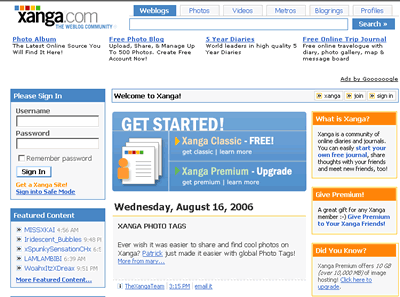Young Children’s Voices in Mathematical Problem Solving
Contributed by Dr Ho Siew Yin and Sng Wei Qin Abbie, from NTUC First Campus, for SingTeach Virtual […]
Read More
In this age of technology, blogging is rampant not just amongst the IT savvy, but even the most “novice” of PC users might have dabbled with blogging. Teachers should try, in fact many have done so, to move away from the traditional pen-and-paper assignments and get their students to blog instead. You will be surprised how motivated students can become and how, by some miracle, they quit complaining about homework.
Weblogs or blogs, as they are popularly known, are web-based publications containing articles of various types, be they memos, diaries or reports by individuals or groups of individuals. Blogs are identified by the inclusion of time and date on their sites, hyperlinks found within them, and their genre (Oravec, 2002).

Blogs allow for exploratory learning. Exploratory learning is a process where learners consult and analyse different sources of information and construct their own meaning (Böttger & Röll, 2004). If we want our students to be independent learners, we should provide them with opportunities for exploratory learning and allow them to construct their own meanings. Blogging is one such avenue.
Presently, one shortfall identified by many teachers in Singapore is that our students lack the ability to think critically. According to Oravec (2002), “Weblog development can empower students to become more analytical and critical…students can define their positions in the context of others’ writings as well as outline their own perspectives on particular issues”.
The students gain practice in writing (and typing), provided of course, that the teacher sets some ground rules such as use of Standard English. Devoted blogging would hone the writing and literacy skills of our students (Kennedy, 2003).
Blogs are indeed a great platform for discussion and exchange of ideas. There would be greater development of ideas due to the more vibrant discussion platform. Konrad Glogowski, an elementary school teacher who is also pursuing his PhD at the Ontario Institute of Education, summed it up thus on his weblog, blog of proximal development:
Blogging made me see every one of my students as a writer-not an empty vessel-but first and foremost a writer-a thinker with unique ideas and thoughts, a person who can contribute to a meaningful conversation about our curriculum or, better yet, a person who can co-construct that curriculum through meaningful conversation, meaningful engagement in a class blogging community…
“Participation as Competence”, posted on September 12, 2005
Seeing comments being posted on their blog sites would boost the students’ sense of ownership of their writing and make them more responsible writers, sensitive to the views/feelings of a real audience (Kennedy, 2003). According to Will Richardson, a high school English teacher from Flemington who has brought blogging into his writing classroom, his students are “more aware of what they’re writing and of the potential audience they’re writing for” (Kennedy, 2003).
Over and above of everything that has already been said, blogging would get our students to read. For it is only through reading and exploring the world out there that our students would be able to sustain their blogs (Downes, 2004) and reflect on their own writing and learning.
There are plenty of benefits that can be derived from introducing blogging into the classroom of the 21st century.
During class discussions not every student gets to voice his or her opinions, and it is physically impossible for the teacher to listen to and respond to all the students in the class. Blogs solve this eternal problem for teachers all over. Also, the shy or extremely inhibited student now has the opportunity to have his or her say without the added stress of having to perform in front of 40 pairs of eyes and ears.
The fun bit of it all is that they get to read their friends’ blogs and comment on them; precious class time is not devoted to reading out their friends’ written work in class but instead used to cover other aspects of the curriculum.

The teacher too is able to give feedback a lot sooner (compared to the traditional written assignments). Others, whether teachers or not, can also post their comments on the blog site. The students would be inspired to produce better quality masterpieces given that their audience is an international one.
Teachers could also use blogs as a means of disseminating instructions on assignments and remind students of assignment deadlines (Vaile, 2003). Well, you might say that we could easily announce them during class time or use the e-mail. True, but recalcitrant students now do not have the excuse of being absent for the day or e-mails that were not received; hence, the onus is now on the students to visit the teacher’s blog site to retrieve announcements and such. Hence, the students take responsibility for their own learning.
Below are some suggested lesson ideas that teachers may want to try out.
Teachers of General Paper (GP), English, Literature, and even Science can get their students to blog on various topics within their discipline (although not necessarily). Blogs can serve as an extension of what was covered in class or, alternatively, used to cover an entire lesson.
Students can be given some reading assignments, after which they are required to blog their comments on the reading. This will also serve as a quick check to see if the students have indeed done their readings. Blogging might be a better alternative to the traditional book reviews that students are forced to write. Short of putting a knife to their throats, it can be a sheer uphill task to get students to read, let alone to get them to write a book review! BUT blogging can make the whole book review assignment fun. Students would simply love to read what their friends have to say on their blogs; and getting a “go ahead, read this great book” from their peers is a better reason to read a book than just taking their teacher’s word for it.
Subjects such as Moral Education and Social Studies which traditionally have been seen as “boring and insignificant” due to their non-examination status can now be given a new lease of life. Issues that might have been seen as too trivial for a classroom discussion can now be blogged. Students are generally interested in what others have to say in their blogs. So, while they might have been mentally “switched off” during the Moral Education lesson, they are more than likely to be alert while blogging.
In fact, it is possible for teachers to collaborate and conduct an entire lesson for two or more classes at the same time using blogs. The focus can be on a single subject or a multidisciplinary approach can be taken. Blogs would even allow for lessons to be conducted across grades where students can learn from their seniors (or vice versa possibly). A blogosphere¹ comprising almost the entire school community or, better still, schools within a cluster or even collaborations with educational institutions outside of Singapore can only but result in a dynamic learning environment.
There are various blog hosting sites that make creating your own personal blog a breeze; and they are absolutely free. Some of the more popular blog hosting sites are Blogger, Pitas, LiveJournal, MoBlog and Xanga. These sites do not require any knowledge of HTML or computer programming. For instance, Blogger allows you to create your very own blog in three easy steps. All you need is an Internet connection.
For those of you who are more IT savvy or simply adventurous, try using server-side Web applications such as Antville , bBlog , Nucleus CMS and WordPress to create your blogs (Wikipedia).
What are you waiting for? Start blogging!
Let’s put the fun back into learning!
References
Böttger, M. & Röll, M., (2004). Weblog publishing as support for exploratory learning on the world wide web. Retrieved September 9, 2005, from https://www.roell.net/publikationen/
Downes, S. (2004). Educational Blogging. In EDUCAUSE Review, 39(5). Retrieved August 8, 2005, from https://www.educause.edu/pub/er/erm04/erm0450.asp?bhcp=1
Glogowski, K. (2005, September 12). Participation as Competence. [Weblog entry]. Blog of proximal development. Retrieved September 16, 2005, from https://www.teachandlearn.ca/blog/2005/09/12/participation-as-competence/
Kennedy, K. (2003). Writing with web logs. In techLearning, February. Retrieved September 2, 2005, from https://www.techlearning.com
Oravec, J. A. (2002). Bookmarking the world: Weblog applications in education. In Journal of Adolescent & Adult Literacy, 45(7), 616–621.
Vaile, J. E. (2003). Blogs in education. In The Stash. Retrieved August 8, 2005, from https://jilleliz.com/The_STASH/blogs_in_education.html